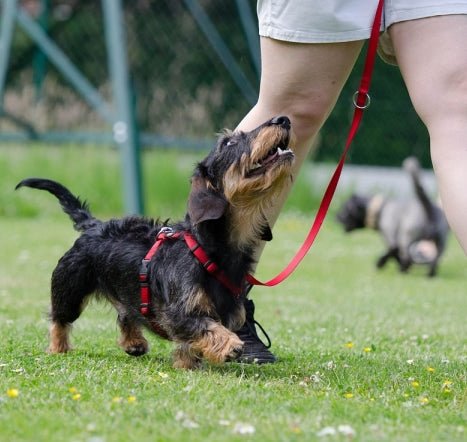Fortunately, there's no such thing as a stubborn dog. The act of being "stubborn" is a human construct meaning "determination not to change one's attitude or position on something, especially in spite of good arguments or reasons to do so." As humans, we tend to project our own emotions and feelings on animals.
We label dogs as smart or not, stubborn or vengeful. I can't tell you how many times someone has come to me with examples of vengeful acts on the dog's part. Dogs don't pee in our shoes or chew our things to teach us a lesson and they DON'T refuse to obey commands because they are stubborn.
Here are five ways you can work through problems with any dog.
Don't Assume They Know
Dogs are quite literally the opposite of stubborn. They will do their best to be compliant when there are no other options. I often say to people - it's great that your dog listens when nothing is going on. It means they are cooperative and want to do the right thing. Once you have put the effort into training this lovely creature, you'll see results - a truly trained dog will listen even when distractions are high. This takes effort from the human and plenty of it! It's crucial to work a consistent and fair training program from start to finish if you expect your dog to listen when there are loads of distractions present. It's unfair and unrealistic to expect your dog to listen in a busy park just because they do in the yard.
Take the time to train the behaviours you want
Your dog doesn't need to be perfect at everything, only at the things that matter to you! There's no point in spending hours and weeks training behaviours that will never be valid in your life. If you know you'll never have a practical application for a formal skill, put it on the back burner. Train the behaviours and skills that are pertinent to you in your life and train them thoroughly. Ensure your dog has a solid understanding of the skills that you do train. Be sure you teach and then spend time perfecting across a variety of locations and through many different distractions so the dog will truly be trained in the skills that are important to your life.
Just Because They Did it Before....
Think quick! How much Grade 12 Calculus do you remember? Likely not much! Our dogs, like ourselves, will retain the knowledge that is practiced in day-to-day life. If you spend your winter hibernating indoors, don't expect to be able to let Fido off leash in the Spring and have a picture perfect recall. Do some refresher work and remind yourself and your dog what the word "come" means before expecting that they remember the skill.
Be Consistent With the Skills You Train
Keep in mind that dogs learn by doing. If you call your dog to come and they don't, either due to a lack of understanding or a distraction they aren't ready for, what do you think happens to your recall? In this scenario and each one like it, your command gets watered down. Dogs learn to ignore commands that are not reinforcing to them. You repeating your command without getting the result you'd like means your dog learns that the word "come" can be ignored. Rehearsal of this will only make things worse. Remember that dogs learn through associations, so if you allow the created association to be a behaviour you don't want, that's what you'll get. Be sure you work consistently and thoughtfully to help your dog create the associations you want.
Consult a Professional
When in doubt, call a dog trainer! If you are confused about why your dog is behaving in a certain way, contact a qualified professional to help you out. We often assume that because we know our dogs so well, we know what they are thinking. When we make assumptions, they're often wrong because we tend to apply human emotions instead of animal behaviour. A qualified behaviourist or professional dog trainer can help you work through the problems you are having by diagnosing them and applying the correct solution.
Dogs are wonderful, intelligent creatures and we owe it to them to be patient and kind and to do our best to find ways to communicate our intentions in a manner they will understand. Applying human emotions will not help us or them.

